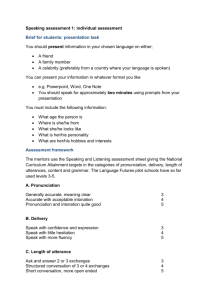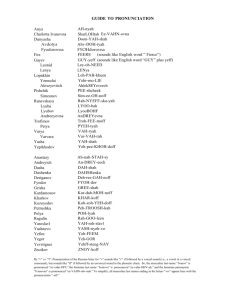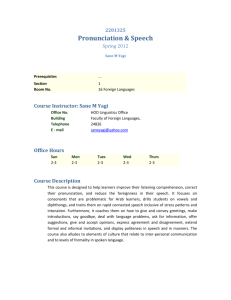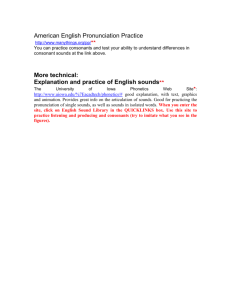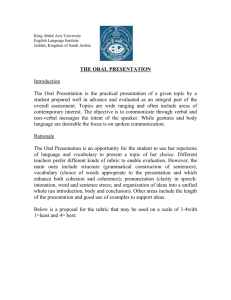LESSON I OVERWIEW Jamilah, M.Pd. Pronunciation Components
advertisement
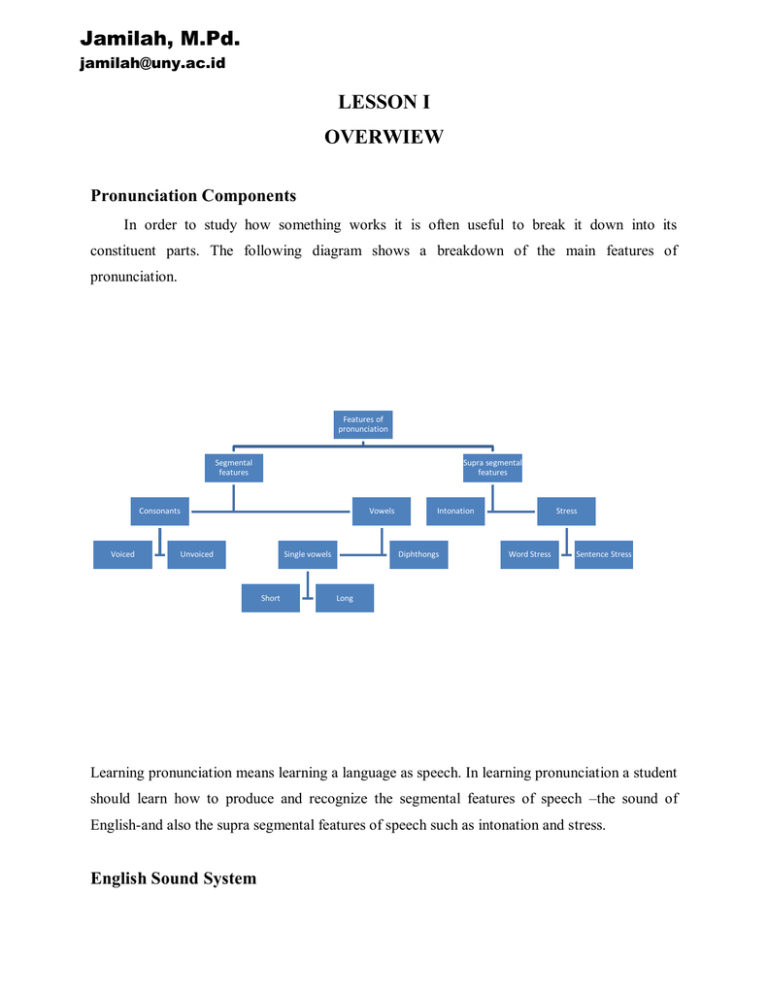
Jamilah, M.Pd. jamilah@uny.ac.id LESSON I OVERWIEW Pronunciation Components In order to study how something works it is often useful to break it down into its constituent parts. The following diagram shows a breakdown of the main features of pronunciation. Features of pronunciation Segmental features Supra segmental features Consonants Voiced Vowels Unvoiced Single vowels Short Intonation Diphthongs Stress Word Stress Sentence Stress Long Learning pronunciation means learning a language as speech. In learning pronunciation a student should learn how to produce and recognize the segmental features of speech –the sound of English-and also the supra segmental features of speech such as intonation and stress. English Sound System English sounds can be categorized into two: vowels and consonants. Vowel sounds are all voiced, and may be single (like /e/ , as in let) or a combination involving a movement from one vowel sound to another (like /ei/ as in late); such combinations are known as diphthongs. On the other hand, consonant sounds may be voiced or unvoiced. Voiced sounds occur when the vocal cords in the larynx are vibrated. It is easy to tell whether a sound is voiced or not by placing one or two fingers on your Adam’s apple. If you are producing a voiced sound, you will feel vibration; if you are producing an unvoiced sound, you will not. The difference between /f/ and /v/, can be heard by putting your top teeth on your bottom lip, breathing out in a continuous stream to produce /f/, then adding your voice to make /v/. Hold your Adam’s apple while doing this, and you will feel the vibration. There are 44 sounds in English: 12 vowels, 8 diphthongs, and 24 consonants. The following table lists English sounds, giving an example of a word in which each appears. Vowels i: I bead Diphthongs eI hit Consonant cake p pin s sue toy b bin z zoo υ book aI high t to ∫ she u: food Iə beer d do ʒ measure e left υə fewer k cot h hello ə about eə where g got m more з: shirt əυ go t∫ church n no call aυ house dʒ judge ŋ sing hat f fan l live run v van r red far θ think j yes dog ð the w wood æ a: Table 1: English Sounds Supra segmental features of Pronunciation Sounds, as we have discussed, are also known as segments. Supra segmental features, as the name implies, are features of speech which generally apply to groups of segments. The supra segmental features which are important in English are stress, intonations, and how sounds change in connected speech. With regard to individual words, we can identify word stress. Usually one syllable in a word will sound more prominent than the others, as in PAper, or BOttle. The stresses in words are usually indicated in dictionaries. With regard to utterances, we can analyze intonation as well as stress, although as features they can at times be quite hard to consciously recognize and to describe. Stress gives rhythm to speech. One or more words within each utterance are selected by the speaker as worthy of stressing, and thus made prominent to the listener. Intonation, on the other hand, is the way in which the pitch of the voice goes up and down in the course of an utterance. (When discussing speech the term utterance is used rather than sentences, as it refers to anything we say including grammatically incomplete sentences, and to different ways of saying the same sentence). Utterance stress and intonation patterns are often linked to the communication of meaning. For example, in the following utterance the speaker is asking a question for the first time. In this particular instance, the pitch of her voice starts relatively high and falls at the end, finishing relatively low. This intonation pattern is shown here using an arrow. 1. Where do you live? If the speaker should ask the question for the second time (having already been given the information, but having forgotten it), then the voice falls on the word where and rises again towards the end of the question. This indicates on the listener that the speaker is aware that they should know the answer. 2. Where do you live? The next examples display how stress can have an equally significant role to play in the communication of meaning. The most stressed syllables within the utterances are in capitals. Changes to which syllable is stressed in the same sentence changes the meaning of the utterance in various subtle ways. The implied meaning is given in brackets after each utterance. 3. I’d like a cup of herbal TEA. (A simple request) I’d like a cup of HERbal tea. (not any other sort of tea) I’d like a CUP of herbal tea. (not a mug) The first example is like the default voice, a first time request, while in the other two examples there is an apparent to clear up some misunderstanding between the speaker and the listener. Notice how the speaker’s voice falls on the syllables which are in capitals. It demonstrates how intonation and stress are strongly linked in utterances. Now consider the following examples: 4. Do you mind if I Open the window? With Do you mind if I open the Window? 5. How long have you been in London? With How long have you been in London? 6. Why don’t you come to my party? With 7. Why don’t you come to my party? Sound changes in connected speech. Sound changes in connected speech are more evident in rapid, everyday speech. In more careful speech (such as when delivering a talk, for example, or when modifying our speech for social purposes such as teaching), we may tend to use them less. These features include assimilation, elision, linking and intrusion, juncture, and contractions. Exercise 1 Pronounce the following words Organize organized organizing Manage managed managing Admire admired admiring Kick kicked kicking Live lived living Note noted noting Wait waited waiting Nod nodded nodding Invite invited inviting Had handed handing chip chips cat cats Snack snacks fit fits Wave waves bag bags Farm farms board boards Match matches bus buses Church churches sketch sketches House houses beach beaches Choose chooses close closes Surprise surprises compose composes Change changes orange oranges Exercise 2 Pronounce the following sentences 1. Are you a student? 2. Do you have time? 3. Are you feeling better now? 4. You have two sisters, don’t you? 5. You can play football, can’t you? 6. It’s a safe investment, isn’t it? 7. Hanny plays for our school team, doesn’t she? 8. You haven’t finished your homework, have you? 9. Mary needs to prepare. 10. Alice ordered the parcel on the nineteenth. 11. I’ve reserved three seats for you yesterday. 12. What’s your name? 13. Where do you live? 14. How many brothers and sisters do you have? 15. How long have you lived here? Exercise 3: Read the following dialogue A: You seem to know your way around campus. Have you been here long? B: I’m a senior literature major. I’ll be graduating next June. A: Your major is literature? Mine is, too. But I’m just beginning my work in my major. I just transferred to this university from a junior college. Perhaps you could tell me about the courses you’ve got to take for a literature major. B: Well, for a literature major you need to take eight courses, three required courses and five electives. First, you have to take “Survey of World Literature, Parts One and Two.” This is really two courses, and it’ll take two semesters, and it’s required for all literature majors. The other course required for all literature majors is “Introduction to Literary Analysis.” A: you mean, if I want to specialize in American literature, I still must take two semesters of World literature? B: yes, because the two semesters are required for all literature majors. A: But I only want to study American literature. B: At least you can take all of your five elective courses in the area that you want. MOTHER, HOW ARE YOU TODAY? (Music: Alice May, Words: Alice May) Chorus Mother, how are you today? Here is a note from your daughter With me everything is ok Mother, how are you today? Mother, don’t worry I’m fine Promise to see you this summer This time there’ll be no delay Mother, how are you today Verse I found the man of my dreams Next time you will get to know him Many things happened while I was away Mother, how are you today? WHEN I NEED YOU When I need you, just close my eyes and I’m with you And all that I so want to give you It’s only a heartbeat away When I need love I hold out my hand and I touch love I never knew there was so much love Keeping me warm night and day Miles and miles of empty space in between us A telephone can’t take the place of your smile But you know I won’t be traveling for ever It’s cold out, but hold out and do like I do When I need you I just close my eyes and I’m with you And all that I so want to give you babe It’s only a heartbeat away It’s not easy when the road is your driver Honey, that’s a heavy load that we bear But you know I won’t be traveling a lifetime It’s cold out, but hold out and do like I do Oh I need you
